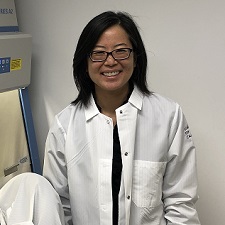Acute myeloid leukemia (AML) is one of the deadliest blood cancers. Mutations in the FLT3 gene are the most common mutations in AML and are associated with poor outcomes in both adult and pediatric patients. Despite the importance of FLT3 mutations in AML, we still do not understand how FLT3 is regulated or the functional impact of novel FLT3 mutations identified in recent large AML sequencing studies. Drugs targeting FLT3 have been successful in achieving remission in AML patients but are limited by the rapid development of drug resistance, particularly due to reactivation of abnormal cancer signaling through the oncogene RAS. While signaling inhibitor combinations (i.e., FLT3i +/-MEK or AKT inhibitor) are an obvious strategy to combat RAS-mediated therapeutic resistance, such combinations have been poorly tolerated in AML patients. Using a genome-wide CRISPRi screen, Dr. Smith [Richard Lumsden Foundation Clinical Investigator] has identified a novel and exploitable dependency on a molecule called RNA Pol II in FLT3-mutant AML with RAS activation. She will test this hypothesis, which may lay the groundwork for future clinical trials of RNA Pol II inhibitor combinations in AML with RAS activation.
Damon Runyon Researchers
Meet Our Scientists
Catherine C. Smith, MD
Project title: "RNA Polymerase II as therapeutic target in AML with RAS activation"
Institution: University of California, San Francisco
Named Award: Richard Lumsden Foundation Clinical Investigator
Award Program: Clinical Investigator
Sponsor(s) / Mentor(s): Neil P. Shah, MD, PhD, and Kevin M. Shannon, MD
Cancer Type: Blood
Research Area: Signal Transduction







